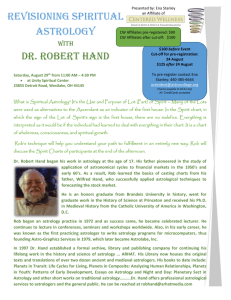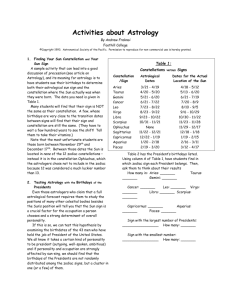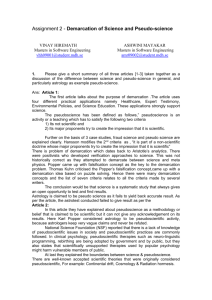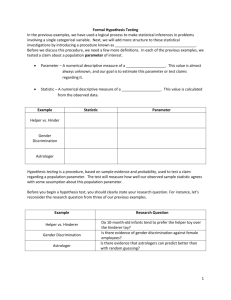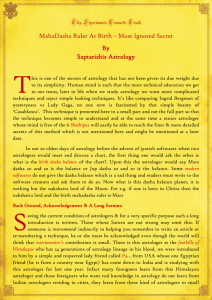Code of Ethics in Word format
advertisement
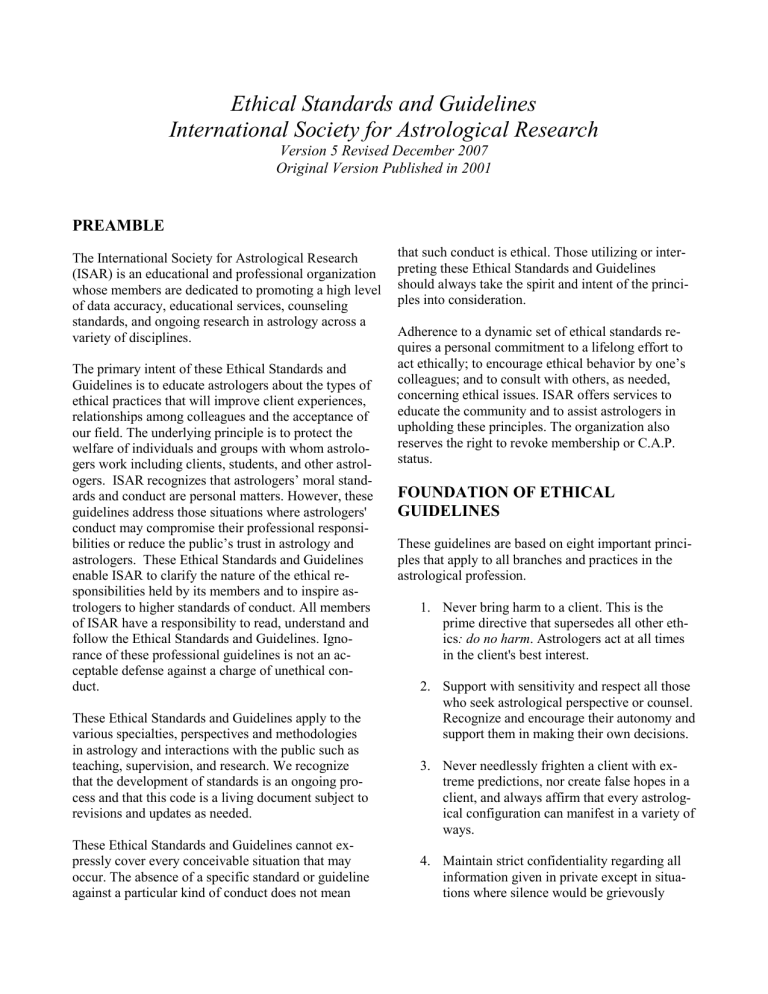
Ethical Standards and Guidelines International Society for Astrological Research Version 5 Revised December 2007 Original Version Published in 2001 PREAMBLE The International Society for Astrological Research (ISAR) is an educational and professional organization whose members are dedicated to promoting a high level of data accuracy, educational services, counseling standards, and ongoing research in astrology across a variety of disciplines. The primary intent of these Ethical Standards and Guidelines is to educate astrologers about the types of ethical practices that will improve client experiences, relationships among colleagues and the acceptance of our field. The underlying principle is to protect the welfare of individuals and groups with whom astrologers work including clients, students, and other astrologers. ISAR recognizes that astrologers’ moral standards and conduct are personal matters. However, these guidelines address those situations where astrologers' conduct may compromise their professional responsibilities or reduce the public’s trust in astrology and astrologers. These Ethical Standards and Guidelines enable ISAR to clarify the nature of the ethical responsibilities held by its members and to inspire astrologers to higher standards of conduct. All members of ISAR have a responsibility to read, understand and follow the Ethical Standards and Guidelines. Ignorance of these professional guidelines is not an acceptable defense against a charge of unethical conduct. These Ethical Standards and Guidelines apply to the various specialties, perspectives and methodologies in astrology and interactions with the public such as teaching, supervision, and research. We recognize that the development of standards is an ongoing process and that this code is a living document subject to revisions and updates as needed. These Ethical Standards and Guidelines cannot expressly cover every conceivable situation that may occur. The absence of a specific standard or guideline against a particular kind of conduct does not mean that such conduct is ethical. Those utilizing or interpreting these Ethical Standards and Guidelines should always take the spirit and intent of the principles into consideration. Adherence to a dynamic set of ethical standards requires a personal commitment to a lifelong effort to act ethically; to encourage ethical behavior by one’s colleagues; and to consult with others, as needed, concerning ethical issues. ISAR offers services to educate the community and to assist astrologers in upholding these principles. The organization also reserves the right to revoke membership or C.A.P. status. FOUNDATION OF ETHICAL GUIDELINES These guidelines are based on eight important principles that apply to all branches and practices in the astrological profession. 1. Never bring harm to a client. This is the prime directive that supersedes all other ethics: do no harm. Astrologers act at all times in the client's best interest. 2. Support with sensitivity and respect all those who seek astrological perspective or counsel. Recognize and encourage their autonomy and support them in making their own decisions. 3. Never needlessly frighten a client with extreme predictions, nor create false hopes in a client, and always affirm that every astrological configuration can manifest in a variety of ways. 4. Maintain strict confidentiality regarding all information given in private except in situations where silence would be grievously 2 Ethics Standards and Guidelines harmful to a client or to another person. 5. Maintain appropriate and clear boundaries with clients regarding one’s own personal needs and goals, whether they are sexual, financial or emotional. b. Referrals to others When astrological or other issues arise that are beyond the scope of the astrologer’s training and practice, the astrologer refers clients to other professionals who are trained in the relevant areas. 6. Maintain and constantly improve one’s astrological skills, practice only within the boundaries of one’s expertise, and refer clients elsewhere when appropriate. c. New Specialty Areas of Practice Astrologers practice in specialty areas new to them only after appropriate education and training. While developing skills in new specialty areas, astrologers take steps to ensure competence in their work. 7. Familiarize oneself with those parts of the ISAR Ethics Standards and Guidelines which apply to one’s branch of astrology; resolve to remain true to the spirit of the principles, and agree to cooperate respectfully with the ISAR Ethics Committee if named in any complaint. d. Continuing Education Astrologers recognize the need for continuing education. This may include attending conferences, taking courses and studying astrological texts. Astrologers strive to maintain competence in the skills they use and are open to new procedures. 8. Enhance astrology’s image by always acting professionally when representing astrology and behaving in a manner that does not damage the status of the profession. e. Professional Associations Astrologers strive to participate in local, state or national associations that foster the development and improvement of astrology. SECTION A: PROFESSIONAL RESPONSIBILITY A.1 DEFINITION A professional astrologer provides astrological services as a source of livelihood or as a career. An astrologer is someone who offers a perspective or opinion based on a thorough analysis of astrological charts, including horoscopes for individuals, couples, organizations, pets and mundane events, and may use transits, progressions and other related methods in the process. Professional astrologers strive to use the most accurate birth data available. A.2. EDUCATION, CREDENTIALS AND AREAS OF EXPERTISE a. Boundaries of Competence Astrologers practice only within the boundaries of their competence, based not only upon their formal education and training, but also upon their appropriate professional experience including teaching, research, consulting and publishing. Astrologers consistently strive to achieve excellence in their work. f. Limitation or Impairment Astrologers refrain from rendering professional services when their physical, mental, or emotional problems are likely to harm a client or others. They are alert to signs of limitation or impairment, seek assistance for problems, and, if necessary, limit, suspend, or terminate their professional responsibilities. g. Credentials Claimed Astrologers must never misrepresent their areas of expertise or their credentials. Astrologers claim or imply only professional credentials possessed and are responsible for correcting any known misrepresentations of their credentials by others. Astrologers do not claim to be psychologists or psychotherapists without the requisite certification. Professional credentials include recognized astrological certifications, graduate degrees in astrology, philosophy, religion, counseling, psychology or closely related fields, government issued certifications or licenses, or any other credential that might indicate to the public specialized knowledge in a field related to their astrological work. Ethics Standards and Guidelines 3 h. Credential Guidelines Astrologers follow the guidelines for use of credentials that have been established by the institutions that issue the credentials. b. Clients or Students The professional relationship is terminated once a romantic or sexual relationship is desired with a client or student. i. Advanced Degrees from Other Fields Astrologers who hold an advanced degree in a field other than astrology identify the area of their expertise in biographical materials. A. 6. ADVERTISING AND SOLICITING A.3. PERSONAL NEEDS AND VALUES a. Personal Needs Astrologers are aware of the intimacy and responsibilities inherent in the consulting relationship, maintain respect for clients, and avoid actions that seek to meet their personal needs at the client’s expense. b. Personal Values Astrologers recognize their own values, attitudes or beliefs, realize that we live in a diverse society, and avoid imposing their values on clients or students. A.4. RESPECTING DIVERSITY a. Nondiscrimination Astrologers do not discriminate against clients, students, or supervisees in a manner that has a negative impact based on their age, color, culture, disability, ethnic group, gender, race, religion, sexual orientation, marital status, socioeconomic status, or for any other reason. b. Respecting Differences Astrologers will actively attempt to understand the diverse cultural backgrounds of the clients with whom they work. This includes, but is not limited to, learning how the astrologer’s own cultural, ethnic, or racial identity affects his or her values, attitudes and beliefs. A.5. SEXUAL MATTERS a. Sexual Harassment Astrologers do not engage in sexual harassment that includes but is not limited to solicitation of sexual favors, physical advances or verbal or nonverbal conduct that is sexual in nature and that is unwanted, unwelcome or offensive. a. Definition Advertising entails, but is not limited to, all paid and unpaid statements in media, brochures, business cards, direct mail promotions, directory listings, resumes, and other printed matter. Advertising also includes statements made in oral presentations such as lectures and classes, as well as comments for use in electronic media such as television, radio, and the Internet. b. Accurate Advertising It is unethical for astrologers to make false, fraudulent, misleading, or deceptive claims that are designed to elicit professional services, products, workshops or training. A statement may be misleading or deceptive if it fails to disclose material facts or is intended or likely to create false or unjustified expectations. Advertisements concerning products, workshops or training must be accurate and disclose adequate information for consumers to make informed choices. c. Statements by Others and the Media Astrologers make reasonable efforts to ensure that statements made by others or by the media about them or the profession of astrology are accurate. d. Promoting to Those Served Astrologers refrain from promoting their products, services, workshops or training in a manner that is deceptive or would exert undue influence on their clients or the general public. Astrologers who recommend remedial measures, such as in the Vedic tradition, should provide a variety of options including, but not limited to prayer, mantras, gemstones, or charitable work. A. 7. FEES AND BARTERING a. Establishing Fees Prior to entering the consultation, astrologers clearly explain to clients all financial arrangements and options related to the scheduled consultation. 4 Ethics Standards and Guidelines b. Bartering Astrologers may accept goods or services in return for astrological services, provided that the relationship is not exploitive and providing there is clear agreement between astrologer and client about their bartering arrangement. c. Referral Fees Astrologers do not accept referral fees because of potential conflict of interest. A.8. RESPONSIBILITY TO OTHER PROFESSIONALS a. Different Approaches Astrologers respect approaches to professional astrology that differ from their own and the traditions and practices of other professional groups with whom they work. b. Public Statements When making personal statements in a public context, astrologers clarify that they are speaking from their personal perspective and not on behalf of all astrologers, any professional organization without authorization, or the profession. c. Personal Disputes Astrologers should refrain from making statements, either orally or in writing that might be construed as disparaging or undermining to another astrologer's reputation or expertise. Any comments made by one astrologer that refer to another should first be clearly explained as a difference in ideas, preferred techniques, viewpoints, etc., and not as a personal attack on any individual. This same professional courtesy should be extended to the discussion of policies or practices of any astrological organization, both local and national. A.9. RESPONSIBILITY TO THE PUBLIC a. Charts of Public Figures Interpretations of the charts of public figures are confined to areas that are considered public domain because the person’s achievements or notoriety has already been revealed in various media. When interpreting charts of public figures, astrologers refrain from making slanderous comments. b. Mundane, Economic or Political Predictions When interpreting charts of global, financial, social, political, geophysical or other mass events, astrologers do not make dire predictions of imminent disaster that are likely to lead to unreasonable fears in the public. Negative predictions are tempered with disclaimers, such as (a) astrology is not an exact science, (b) astrological variables can manifest in different events of similar meaning, and (c) astrology cannot predict with absolute certainty the outcome of future astronomical events. c. Media Presentations When astrologers provide advice or comment by means of public lectures or broadcasts, demonstrations, prerecorded or printed materials, or any other media, they take reasonable precautions to ensure that the statements are based on sound astrological and ethical principles. d. Unreasonable Claims Astrologers do not exploit the anxieties and gullibility of the public. It is unethical to encourage people to purchase astrological services or products that promise specific outcomes such as love, happiness, or prosperity. Astrologers do not claim that their services or products will protect against negative future events. e. Pro Bono Service Astrologers strive to contribute to society by devoting a portion of their professional activity to services for which there is little or no financial return. SECTION B: CONFIDENTIALITY B.1. RIGHT TO PRIVACY a. Respect for Privacy Astrologers respect their client’s right to privacy and avoid unwarranted disclosures of confidential information. b. Confidentiality of Records Astrologers exercise due diligence regarding the safety and confidentiality of any records they create, maintain, or transfer whether the records are written, taped, computerized, or stored in any other medium. Astrologers ensure anonymity of any private citizens or clients whose birth data are used in lectures, research, training or publications. Ethics Standards and Guidelines 5 c. Multiple Relationships When an astrologer agrees to provide consulting services for someone at the request of a third party, the astrologer clarifies that confidentiality will be maintained with respect to both parties. d. Exceptions The general requirement that astrologers keep information confidential does not apply when disclosure is required to prevent clear and imminent danger to the client or others. Astrologers consult with other professionals, such as lawyers and state licensed medical professionals, when in doubt as to the validity of an exception. The client or their legally recognized representative may waive the right to privacy. e. Peer Supervision Astrologers obtain the client’s permission before presenting client information to a peer or supervisor and assure clients that their names and other nonessential information will be withheld. g. Clients Who Are Minors When interpreting charts of individuals who are minors and who are unable to give informed consent, parents or guardians may be included in the consulting process. h. Permission to Record or Observe Astrologers obtain permission from clients before recording or having others observe a session. Clients are informed of the purpose of the recording. If the purpose changes at any future time, specific permission is first obtained from the client. B.2. THIRD PARTY HOROSCOPES a. Interpretation of a Third Party’s Horoscope If a client requests an interpretation of another person’s chart, the astrologer focuses only on general information about the third party that helps the client understand the relationship. Otherwise the astrologer requires specific permission from the third party for any extensive interpretation. This applies to interpretation of all relationship chart techniques. SECTION C: DISCLOSURES TO CLIENTS a. Fees and Appointments When making appointments, astrologers clearly inform clients of the fee, duration, and location of the session. b. Nature of service When a consultation is initiated, astrologers ascertain the needs and goals of the client and inform the client of the purposes, procedures, benefits and limitations of their services. c. Non-Astrological Techniques and Practices Astrologers who use other techniques in their practices (such as Tarot, Numerology, or psychic abilities) distinguish these sources of information from astrological sources and techniques. d. Conveying Information Astrologers are mindful of the limitations of predictive accuracy and avoid the use of universal qualifiers such as every, always, never, for certain, any, no one, or other such blanket statements that imply definite, concrete outcomes. Clients are informed that it is impossible for astrology to be absolutely certain about personality profiles or future events. When providing personality profiles or forecasts of future events astrologers avoid unwarranted certainty and dogmatic interpretations of chart variables. Astrologers are encouraged to use terms that are not absolute or fatalistic, such as may, could, might, perhaps, and possibly. Astrologers assure their clients that chart factors operate on a spectrum and in a multidimensional, multi-level mode of expression. g. Reincarnational Astrology Astrologers acknowledge that prior-life information is, in and of itself, a matter of personal belief and therefore difficult to evaluate directly. Astrologers who interpret chart symbolism in terms of karma and reincarnation convey respect for their clients' right to choose other ways of looking at life. If a client is uncomfortable with reincarnation, the astrologer either disqualifies himself or herself from working with that client, or presents alternative perspectives. When using reincarnational imagery, astrologers emphasize to their clients that these symbols are not lit- 6 Ethics Standards and Guidelines eral or one-dimensional but are subject to multiple interpretations and that the astrologer is attempting to invoke an understanding of psychological dynamics rather than concrete biographical facts from prior lifetimes. They encourage their clients to test the reincarnational information by consideration of its relevance to the circumstances of the present life. Always, astrologers practicing this kind of astrology strive to be sensitive to its unique risks in terms of creating destructive guilt or ego inflation in the client. b. Nature of Prediction Astrologers do not make predictions that are likely to lead to unreasonable fears in the client. Predictions are not made of calamitous events or other negative outcomes without balancing the interpretation with more positive possibilities. Efforts are made to assure the client that while some periods may be more challenging than others, astrologers make every attempt to provide perspective and encourage a client’s resourcefulness. SECTION D: CONSULTING ASTROLOGY D.4. CLIENTS SERVED BY OTHER PROFESSIONALS If an astrologer learns that a client is receiving services from a mental health professional, the astrologer encourages the client to tell the therapist about the astrological consultation to avoid conflict. The astrologer’s only obligation is to advise the client that such notification is in most cases in the client’s best interest. D.1. DEFINITION An astrological consultant is one whose services include discussion of an astrological chart in order to (1) help individuals recognize their strengths and talents; (2) provide insight into life issues; (3) highlight patterns of growth and development; (4) confirm selfknowledge; (5) suggest the life purpose; (6) reveal periods of challenge and opportunity; (7) explore the meaning of a particular experience or phase of life; or (8) provide guidance as to timing or decisions with regard to a particular course of action. D.2. CLIENT WELFARE D.5. MULTIPLE CLIENTS When astrologers agree to consult separately with two or more clients who have a relationship, astrologers ensure confidentiality for each client. If a conflict arises, the astrologer clarifies roles and responsibilities, and, if necessary, declines to provide further services. a. Positive Growth and Development Astrologers encourage client growth and development and avoid fostering dependent relationships. Astrologers do not tell clients what they should do with respect to choices in relationships, career, relocation, sex, finances, or any other matter. While the astrologer may clarify matters as revealed in the chart, provide insight into the nature of conflicts, empathize with the client’s dilemma, or recommend a course of action, the astrologer respects and supports the client’s capacity for decision-making. SECTION E: RESEARCH D. 3. PREDICTIVE WORK a. Information Affecting Outcome When reporting research results, researchers explicitly mention all variables and conditions that may have affected the outcome of the study or the interpretation of data. a. Claims of Infallibility No astrologer claims to be infallible in the prediction of any particular event. The astrologer provides a reasonable range of meanings and possible outcomes when forecasting or making predictions. E.1. DEFINITION Astrological research covers the gamut from casual studies and anecdotal evidence to statistical research. The essence of ethical astrological research is the fair and accurate reporting of results. In general the standard rules of good scientific research apply. E.2. REPORTING RESULTS b. Designation of Data Sources Researchers are required to report the source of their data including a citation of the collector’s name as well as the original source of the birth record. Re- Ethics Standards and Guidelines 7 searchers are required to use a source rating system similar to the Rodden rating system to indicate the reliability of the data. c. Accurate Results Researchers plan, conduct, and report research accurately and in a manner that minimizes the possibility that results will be misleading. They provide thorough discussions of the limitations of their data and offer alternative hypotheses. Researchers do not engage in fraudulent research, distort data, or deliberately bias their results. d. Obligation to Report Unfavorable Results Researchers communicate the results of their research whether or not the results were favorable. Both positive and negative results help build the body of knowledge. Results that reflect unfavorably on institutions, programs, services, prevailing opinions, or vested interests are not withheld. e. Identity of Subjects Researchers take care to disguise the identity of their subjects unless specific written permission has been obtained. Identifying information about public figures, derived from the public domain, need not be disguised. f. Replication Studies Researchers are obligated to make available sufficient original research data to qualified professionals who may wish to replicate the study or do a metastudy. Secondary researchers should respect and maintain the anonymity established by primary researchers. g. Statistical analysis Researchers refrain from making definitive statements unless they have built a sound study with a proper control group and have taken into account astronomical variables. When discussing the results of informal research, researchers use qualifying words such as may, could, appears to, suggests or seems to. Researchers recognize the difference between statistical significance and predictive significance when analyzing and discussing their results. Statistical significance can come from a small difference in the sample, which isn't useful in making predictions about individuals. SECTION F: PUBLICATION a. Intellectual Property All written materials are considered the exclusive intellectual property of the author or publisher depending on copyrights laws in effect and on the agreement between them. Astrologers must be aware of the potential for plagiarism and refrain from copying materials authored by others without explicit permission or due credit. Likewise, the data and results of a research study are the intellectual property of the researchers who designed and conducted the study, unless specific contractual arrangements have been made. For intellectual honesty, all funding sources and restrictions should be mentioned in the report. b. Recognition of Others When conducting and reporting research, or when presenting a theory, researchers are familiar with and give recognition to previous work on the topic, observe copyright laws, and give full credit to those to whom credit is due. Specifically: * If you got an idea from someone else, acknowledge the source of the idea. * If you quote someone, quote them accurately and don't quote fragments out of context in a way that distorts the meaning of the source text. * If you did not do all the work on a project yourself, make sure everyone who contributed is properly credited in the final report about the work. c. Duplicate Submission Astrologers submit manuscripts or articles for consideration to only one journal or magazine at a time, unless the publisher is informed. Manuscripts or articles that are published in whole or in substantial part in another journal or magazine are not submitted for publication without acknowledgment and permission from the previous publication. d. Professional Review Astrologers who review pre-publication material respect the confidentiality and proprietary rights of the authors. The work should not be discussed until pub- 8 Ethics Standards and Guidelines lished unless explicit permission is given. Evaluation of the work should be based entirely on the content of the material, not on the reviewer's personal astrological beliefs. Criticisms should be made respectfully and concretely. e. Software Programs Astrologers do not knowingly replicate codes or programs from other astrological software publishers. SECTION G: FINANCIAL ASTROLOGY G.1. DEFINITION Astrologers, who, for profit or compensation, utilize astrology to advise or present an opinion on stocks, bonds, mutual funds, commodity futures contracts, or options are financial astrologers. This category also includes astrologers who present an opinion on any matters pertaining to financial planning and portfolio structuring. Financial astrologers demonstrate an understanding, knowledge of and proficiency in market movements through extended study. G.2. PROPER CREDENTIALS a. Legal compliance Financial astrologers must comply with the appropriate regulatory agencies of their state or country before giving advice for compensation on financial planning or portfolio structuring. It is up to the financial astrologer to know and to abide by applicable laws regarding registration and practice. Financial astrologers must pass all exams on giving investment or trading advice as required by law in one’s country of residence. b. Opinions versus Recommendations The financial astrologer who is not licensed by the proper securities regulatory agencies of his or her country must be very clear in stating that the advice given is an opinion only, and not a recommendation, to buy or sell a particular financial instrument. G.3. ADVERTISING a. Promotional Statements All statements made by financial astrologers in promotional material are factually true. Astrologers document all claims and do not utilize promotional material that is likely to deceive or mislead. Likewise, financial astrologers do not omit facts if the omission would make the promotional material deceptive or misleading. b. Profit and Loss Statements concerning the possibility of profit must be accompanied by an equally prominent statement of the risk of loss. c. Hypothetical Results References to past hypothetical results that could have been achieved by employing some particular trading system or astrological software program must be accompanied by a disclaimer that past hypothetical results are no guarantee of future performance. d. Actual Performance Statements about past performance must be accurately portrayed. e. Opinion Statements Statements of opinion must be identified as such, and must have a reasonable basis in fact. For example, Financial Astrologers cannot claim that, "your investments will earn at a minimum annual rate of 20%." Such claims must be documented with empirical evidence. However, positive statements by others about the financial astrologer’s results are permissible in advertising, providing that these statements are actual, were unsolicited by the financial astrologer, and written permission was obtained. f. Truth in Advertising Financial astrologers do not make inflated claims when advertising their services or software. Claims of having "the best software program" or that one is "the best financial astrologer" are in violation of United States Federal regulations, and may violate regulations of other countries as well. Ethics Standards and Guidelines 9 G.4. GIVING FINANCIAL ADVICE a. Using Absolute Terminology Clients are informed that it is impossible for astrology to be absolute about future events, such as what the market will do on any given date or time period. Financial astrologers do not make astrological forecasts in absolute or inevitable terms, such as every, always, never, for certain, any, no one, or other such statements that imply definite, concrete outcomes. Instead financial astrologers utilize terms such as may, could, might, perhaps, and possibly, with efforts to ground these statements whenever possible in research studies. b. Referrals If financial astrologers lack the appropriate training or qualifications in a particular area, they refer their clients elsewhere. G. 5. CLIENT SUITABILITY Financial Astrologers do not give specific investment or trading advice to a client who may be unsuitable for making such investments or trades. The client’s age, investment experience, trading experience, financial goals and objectives, annual income, net worth and available investment funds must be considered before giving investment advice. All relevant factors considered in making specific recommendations are disclosed to clients. b. Inflated Claims Business astrologers do not make unreasonable, inflated or definitive claims about their services with regard to company welfare or profits. H.3. GIVING BUSINESS ADVICE a. Profit and Loss When advising businesses in matters that may affect company profits, the astrologer apprises the client of the risk of loss as well as the possibility of profit. b. Personnel Decisions Astrologers and employers must be aware of any legal considerations and the potential for perceived discrimination when asking for employees’ birth data, whether before or after a hiring decision is made. In working with the charts of employees, business astrologers require the employer to obtain voluntary written permission. Employers must notify employees of their intention in using the birth data. The astrologer's statements about employees are limited to matters that pertain to their potential role within the company. c. Business Partnerships When working with the chart of a client's business partner or associate, astrologers require the client to obtain permission from the other person before disclosing information about the chart. Statements about that person are limited to matters that pertain to his or her potential role within the company. SECTION H: BUSINESS ASTROLOGY H.1. DEFINITION Astrologers who advise businesses in matters of hiring, personnel, administration, expansion, downsizing, financial planning, earning cycles, incorporation dates, trade dates, starting dates, and other important dates are business astrologers. H.2. ADVERTISING a. Factually True Statements All statements made by business astrologers in promotional material are factually true and verifiable. d. Universal Qualifiers When making business forecasts astrologers do not use universal qualifiers such as ever, always, never, for certain, any, no one, or other such blanket statements that imply definite, concrete outcomes. Clients are informed that it is impossible for astrology to be absolute about future events, such as how an employee will behave or what a business will do. Accordingly, business astrologers utilize terms that are open ended and indeterminate, such as may, could, might, perhaps, and possibly. 10 Ethics Standards and Guidelines SECTION I: HORARY AND ELECTIONAL ASTROLOGY I.1. DEFINITION Astrologers who answer questions by casting horoscopes for the moment the question is asked are horary astrologers. Horary astrologers answer questions pertaining to business dealings, purchases, lost objects, job related decisions, relationships, and other matters that permit definitive answers to specific questions. Astrologers who assist clients in choosing or “electing” a specific date or time for an event—e.g., a wedding, surgery, incorporation, an inauguration, or the signing of a contract—are electional astrologers. Electional astrologers inform clients that the elected time indicates the best potential moment for initiating an act or event, not a guarantee of a successful end result. I.2. BUSINESS PRACTICES a. Nature and Scope of Services A horary client needs to know that the same question cannot be asked twice. For electional work, the client is told that an electional chart cannot produce outcomes that are radically inconsistent with the natal chart, or the transits, progressions and directions in effect at the time the work is done. Clients are informed that electional astrology is not an exact science and that the answers that astrologers provide are not infallible. Use of electional astrology cannot prevent negative consequences from affecting the life of the client. In no instance should electional astrology be used in support of immoral activity, such as the best time to attempt a burglary, or in any effort to deliberately harm another person. I.3. QUESTIONS, ANSWERS AND ADVICE a. Accepting Questions Horary astrologers are aware that the answers they give to questions may influence the client’s subsequent expectations, decision-making and behavior or may operate as self-fulfilling prophesies. Consequently the astrologer is sensitive in delivering the information. Horary astrologers avoid answering questions that involve absolute certainties such as “Will I ever marry again?” or “Will I ever become president of my company?” The client is assisted in rewording the question in a more provisional form that involves time periods that are not final, e.g., “Will I marry again in the next three years?” b. Refusing Questions Horary astrologers do not accept questions that they are unable or unwilling to answer. Once a question is accepted, they are aware that a refusal to answer the question may itself be misconstrued as an answer. c. Questions about Death Horary astrologers are extra cautious about questions that pertain to life and death and are aware that the answers they provide may have an affect on the outcome in question. If at all possible, such questions are not accepted. d. Clarifying Questions Horary astrologers help their clients phrase questions in a manner that permits an intelligible answer. Astrologers do not attempt to answer questions or offer advice if there is any confusion as to what the astrologer is being asked to answer or elect. e. Third Party Questions Horary astrologers avoid questions that involve the lives of third parties, i.e., someone other than the client, because there is a probability of inaccuracy in answering such questions. Horary astrologers are also aware that answers to third-party questions may entail undue interference in the life of the third party. SECTION J: STRUCTURE OF ISAR’S ETHICS COMMITTEES J.1. DEFINITION ISAR offers ethics education, advice and mediation to its members. To provide these services, ISAR has two committees: an ISAR Ethics Education Committee and an ISAR Ethics Mediation Committee. * The main purposes of the ISAR Ethics Education Committee are: educate the membership about ISAR’s Ethics Standards and Guidelines, provide advice on interpreting the document, ensure that the document re- Ethics Standards and Guidelines 11 flects the best practices of the profession, and review and revise as necessary. * The main purpose of the Ethics Mediation Committee is to review all allegations of ethical violations brought to its attention. The Committee obtains full information from the complainant and the party complained against, and seeks to engage all relevant parties in mediation. Its goal is mutually satisfactory resolution. SECTION K: RESOLVING ETHICAL QUESTIONS K.1. FOUNDATIONS a. Ethical Behavior Expected Astrologers expect colleagues to adhere to the ISAR Ethics Standards and Guidelines. When astrologers have a reasonable basis for questioning the ethics of another astrologer’s conduct or statements, they contact any member of ISAR’s Board of Directors. b. Seeking advice When uncertain as to whether a particular situation or course of action may be in violation of ISAR’S Ethics Standards and Guidelines, astrologers consult with appropriate authorities such as those on the ISAR Ethics Education Committee. c. Informal Resolution When astrologers have reasonable cause to believe that another astrologer is violating an ethical stand- ard, they may first attempt to resolve the issue informally with the other astrologer, providing that such action does not violate any client confidentiality rights. d. Unwarranted Complaints Astrologers do not initiate, participate in, or encourage the filing of ethics complaints that are unwarranted or solely intended to harm another astrologer. K.2. REPORTING ETHICS VIOLATIONS a. Filing a Formal Complaint Complaints may be brought to the attention of any ISAR Board member who will then relay the complaint to the appropriate committee. Alternatively, complaints may be brought directly to a member of the Ethics Mediation Committee. b. Resolution of Formal Complaints When a formal complaint is lodged against an ISAR member the committee obtains a written statement of the complaint, with any relevant documentation. The committee then contacts the party complained against, discusses the complaint and assesses willingness to mediate. The committee then invites the parties to mediation and appoints a mediator. c. Cooperation With ISAR’s Ethics Mediation Committee ISAR expects that its members will agree to mediation if invited and to comply with efforts to arrive at a successful resolution.
